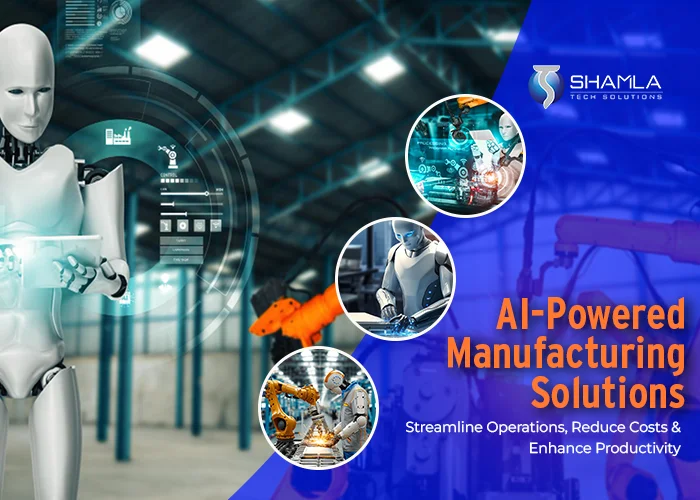Introduction to AI in Manufacturing
Artificial Intelligence (AI) is revolutionizing the manufacturing industry, ushering in a new era of efficiency, precision, and innovation. The integration of AI into manufacturing processes is reshaping the industry by enhancing production capabilities, optimizing operations, and fostering a smarter, more agile manufacturing environment.
AI’s impact on manufacturing is profound, touching various aspects of the production lifecycle. One of the most significant benefits is the improvement in productivity and efficiency. AI algorithms can analyze vast amounts of data in real time, providing insights that help optimize production schedules, predict equipment failures, and streamline supply chain operations. This leads to reduced downtime, lower operational costs, and increased output.
Moreover, AI enhances product quality by enabling more precise control over manufacturing processes. Machine learning models can identify patterns and anomalies in production data, allowing for early detection of defects and ensuring consistent product quality. This not only minimizes waste but also increases customer satisfaction by delivering superior products.
The role of AI extends beyond the factory floor. In supply chain management, AI algorithms can forecast demand more accurately, manage inventory levels efficiently, and optimize logistics routes. This results in a more responsive and resilient supply chain, capable of adapting to market fluctuations and disruptions.
Another critical application of AI in manufacturing is predictive maintenance. Traditional maintenance strategies often rely on scheduled inspections, which can be inefficient and costly. AI-powered predictive maintenance, on the other hand, uses data from sensors and equipment to predict when maintenance is needed, preventing unexpected breakdowns and extending the lifespan of machinery.
AI also plays a pivotal role in advancing Industry 4.0, the ongoing automation and data exchange trend in manufacturing technologies. By leveraging AI, manufacturers can create smart factories where machines communicate with each other and make autonomous decisions. This interconnected environment enhances overall operational efficiency and fosters innovation.
The importance of AI in modern industrial processes cannot be overstated. It enables manufacturers to stay competitive in a rapidly evolving market by improving agility, reducing costs, and enhancing product quality. As AI technology continues to evolve, its applications in manufacturing will expand, driving further advancements and transforming the industry. Embracing AI is no longer a luxury but a necessity for manufacturers aiming to thrive in the digital age.

The Role of AI in Manufacturing
Artificial intelligence (AI) is significantly transforming the manufacturing industry by enhancing production processes and driving operational efficiencies. The integration of AI in manufacturing brings a myriad of benefits, from optimizing workflows to improving product quality and reducing costs. The key functions and applications of AI in manufacturing demonstrate its vital role in this sector.
One of the primary functions of AI in manufacturing is predictive maintenance. AI algorithms analyze data from various sensors embedded in machinery to predict potential equipment failures before they occur. This proactive approach minimizes downtime and reduces maintenance costs, thereby enhancing overall production efficiency. By anticipating issues, manufacturers can perform maintenance during scheduled downtimes rather than facing unexpected breakdowns, leading to significant cost savings and improved operational continuity.
Another crucial application of AI in manufacturing is quality control. AI systems can detect defects and inconsistencies in products with higher precision than human inspectors. Machine learning models trained on vast amounts of production data can identify even the slightest deviations from the desired standards, ensuring consistent product quality and reducing waste. This capability is particularly valuable in industries where precision is critical, such as automotive and electronics manufacturing.
AI-driven automation is revolutionizing manufacturing by streamlining repetitive and labor-intensive tasks. Robots powered by AI can perform complex tasks with high accuracy and speed, increasing production rates while reducing the likelihood of human error. This type of automation and AI integration not only boosts efficiency but also allows human workers to focus on more strategic and creative tasks, fostering innovation within the company.
Examples of AI-driven improvements in production efficiency are abundant. For instance, AI automation companies are developing sophisticated AI marketing automation tools that help manufacturers optimize their supply chains. These tools predict demand trends, manage inventory levels, and streamline logistics operations, ensuring that products are delivered on time and costs are minimized.
The role of artificial intelligence in manufacturing is multifaceted, encompassing predictive maintenance, quality control, and AI-driven automation. As AI continues to evolve, its applications in the manufacturing industry will expand, leading to even greater efficiencies and innovations. Embracing AI in manufacturing is not only a strategic advantage but also a necessity for staying competitive in the modern industrial landscape.
Benefits of AI Manufacturing Software
The implementation of AI in manufacturing has brought about a revolutionary shift in how production processes are managed and optimized. The advantages of incorporating AI in manufacturing software are vast, providing enhanced productivity, reduced operational costs, improved product quality, and predictive maintenance.

Enhanced Productivity and Efficiency
AI in manufacturing significantly enhances productivity and efficiency. AI algorithms streamline various production processes by automating repetitive tasks and optimizing workflows. This leads to faster production cycles and higher output rates. AI automation systems can operate around the clock without fatigue, ensuring continuous and efficient operations. As a result, manufacturers can meet increasing demands without compromising on quality.
Reduced Operational Costs
Artificial intelligence in manufacturing contributes to substantial cost savings. By automating tasks that were previously done manually, AI reduces labor costs and minimizes human error. AI-driven predictive maintenance systems also help in reducing operational costs by predicting when equipment is likely to fail and scheduling maintenance during non-peak hours. This proactive approach prevents costly unplanned downtimes and extends the lifespan of machinery.
Improved Product Quality and Consistency
AI in the manufacturing industry ensures that product quality and consistency are maintained at the highest levels. Machine learning models analyze production data in real-time to detect defects and inconsistencies that might be missed by human inspectors. This level of precision ensures that only products meeting the highest quality standards reach the market. Moreover, AI systems continuously learn and improve, leading to ongoing enhancements in product quality.
Predictive Maintenance and Reduced Downtime
AI and manufacturing go hand-in-hand when it comes to predictive maintenance. AI-driven systems monitor machinery and equipment in real-time, analyzing data to predict potential failures before they occur. This allows manufacturers to perform maintenance during scheduled downtimes, reducing unexpected breakdowns and associated costs. Predictive maintenance not only extends the life of equipment but also ensures smooth and uninterrupted production processes.
AI Automation Companies and AI Marketing Automation
AI automation companies are at the forefront of developing sophisticated AI solutions tailored for the manufacturing sector. These solutions include AI marketing automation tools that help manufacturers optimize their supply chains, manage inventory, and forecast demand more accurately. Automation and AI integration enable manufacturers to streamline operations, reduce waste, and enhance overall efficiency.
Key Features of AI Manufacturing Software
The integration of AI in manufacturing has revolutionized industrial processes by introducing advanced technologies that enhance efficiency, productivity, and quality. Here are some key features of AI manufacturing software that are driving this transformation:
Machine Learning Algorithms :
At the core of AI in manufacturing is the use of machine learning algorithms. These algorithms enable the system to learn from historical data and improve over time. By analyzing patterns and trends, machine learning models can optimize production schedules, enhance supply chain management, and predict potential issues before they occur. This continuous learning process helps manufacturers adapt to changing market demands and improve operational efficiency.
Real-time Data Analysis and Monitoring:
Artificial intelligence in manufacturing relies heavily on real-time data analysis and monitoring. AI systems collect data from various sensors and devices on the production floor, providing a comprehensive view of the manufacturing process. This real-time monitoring allows for immediate detection of anomalies, enabling quick corrective actions to maintain product quality and consistency. Additionally, real-time data analysis helps in optimizing resource allocation, reducing waste, and improving overall productivity.
Automation and Robotics Integration:
AI in the manufacturing industry often involves the integration of automation and robotics. AI-powered robots can perform repetitive and complex tasks with high precision and speed. This automation not only increases production rates but also ensures consistency and accuracy in manufacturing processes. The combination of AI and robotics reduces human intervention, minimizes errors, and allows workers to focus on more strategic and creative tasks. AI automation companies are continually developing innovative solutions to enhance robotic capabilities in manufacturing.
Predictive Analytics and Maintenance:
One of the most significant benefits of AI and manufacturing is predictive analytics and maintenance. AI systems analyze historical and real-time data to predict when equipment is likely to fail, allowing for proactive maintenance. This predictive maintenance approach reduces downtime, extends the lifespan of machinery, and lowers maintenance costs. By scheduling maintenance activities during non-peak hours, manufacturers can ensure continuous production and minimize disruptions.
AI Marketing Automation:
AI marketing automation plays a crucial role in optimizing manufacturing processes. By analyzing market trends and customer demand, AI systems help manufacturers make informed decisions about production volumes, inventory management, and supply chain logistics. Automation and AI enable manufacturers to respond quickly to market changes, reduce lead times, and improve customer satisfaction.
The key features of AI manufacturing software—machine learning algorithms, real-time data analysis, automation and robotics integration, and predictive analytics—are transforming the manufacturing industry. These advanced technologies offer significant benefits, including enhanced productivity, improved product quality, and reduced operational costs, positioning manufacturers for success in an increasingly competitive market.
Implementation of AI in Manufacturing Processes:
Implementing AI in manufacturing processes involves several crucial steps that require careful planning and execution. Here’s a detailed look at how to integrate AI software in manufacturing, the challenges involved, and solutions to overcome them, illustrated with case studies of successful AI adoption.

Steps to Integrate AI Software in Manufacturing
Assess Needs and Goals: The first step is to identify specific areas where AI can add value. This includes assessing the current manufacturing processes, identifying inefficiencies, and setting clear objectives for AI integration.
Data Collection and Preparation: AI in manufacturing relies heavily on data. Companies need to collect high-quality data from various sources, such as sensors, machines, and enterprise systems. This data must be cleaned, labelled, and structured to train AI models effectively.
Choose the Right AI Tools and Partners: Selecting appropriate AI tools and partnering with experienced AI automation companies is crucial. These partners can provide the necessary technology and expertise to develop and implement AI solutions tailored to the manufacturing industry’s needs.
Develop and Test AI Models: Using machine learning algorithms, companies can develop AI models that address specific challenges. These models should be rigorously tested in controlled environments to ensure accuracy and reliability.
Integration and Deployment: Once the AI models are validated, they can be integrated into the existing manufacturing processes. This may involve updating software systems, deploying sensors, and ensuring seamless communication between AI tools and manufacturing equipment.
Training and Support: Training employees to work with AI systems is essential for successful implementation. Ongoing support and maintenance are also necessary to ensure the AI systems function optimally and adapt to changing needs.
Challenges and Solutions in AI Implementation
Implementing artificial intelligence in manufacturing comes with challenges such as high initial costs, data security concerns, and resistance to change. Solutions to these challenges include:
- High Costs: Start with small-scale pilot projects to demonstrate ROI and gradually scale up.
- Data Security: Implement robust cybersecurity measures to protect sensitive manufacturing data.
- Resistance to Change: Educate and involve employees in the AI adoption process to alleviate concerns and encourage buy-in.
- Case Studies of Successful AI Adoption in Manufacturing
Several companies have successfully integrated AI into their manufacturing processes, showcasing the potential of AI and manufacturing:
- General Electric (GE): GE implemented AI for predictive maintenance across its manufacturing plants. By using AI to analyze data from machinery, GE reduced unplanned downtime and maintenance costs significantly.
- Siemens: Siemens leveraged AI in manufacturing industry processes by integrating machine learning algorithms to optimize production lines. This resulted in improved efficiency and reduced waste.
- BMW: BMW adopted AI automation for quality control. AI-powered systems inspect vehicles for defects more accurately than human inspectors, ensuring higher product quality and consistency.
The implementation of AI in manufacturing processes requires careful planning, the right tools, and overcoming specific challenges. With successful case studies like GE, Siemens, and BMW, it is clear that AI can significantly enhance manufacturing efficiency, reduce costs, and improve product quality.
AI and the Future of Smart Manufacturing
The integration of AI in manufacturing is revolutionizing the industry, driving it towards a smarter and more efficient future. Emerging trends in AI manufacturing software, the role of IoT and big data, and future prospects and advancements in AI technology are key factors shaping this transformation.
Emerging Trends in AI Manufacturing Software
AI in manufacturing is evolving rapidly, with several emerging trends set to redefine the industry. One such trend is the adoption of AI automation and robotics integration, where machines are not only automated but also intelligent enough to make decisions and adapt to changing conditions. AI-driven predictive maintenance is another critical trend, enabling manufacturers to foresee equipment failures before they occur, thus reducing downtime and maintenance costs. Furthermore, the rise of AI marketing automation allows manufacturers to optimize their supply chains, enhancing efficiency and reducing costs.
The Role of IoT and Big Data in Smart Manufacturing
The Internet of Things (IoT) and big data play pivotal roles in the development of smart manufacturing. IoT devices, such as sensors and connected machines, continuously collect vast amounts of data from the manufacturing floor. This data, when processed and analyzed by AI in manufacturing industry systems, provides valuable insights into operational efficiency, equipment performance, and product quality. Big data analytics allows manufacturers to make informed decisions, optimize processes, and enhance productivity. The combination of AI and IoT, known as AIoT, enables real-time monitoring and control of manufacturing processes, leading to significant improvements in efficiency and agility.
Future Prospects and Advancements in AI Technology
The future of artificial intelligence in manufacturing looks promising, with several advancements on the horizon. Enhanced machine learning algorithms and advanced data analytics will enable more accurate predictions and smarter decision-making. Integration with augmented reality (AR) and virtual reality (VR) technologies will provide immersive training and remote maintenance capabilities. Additionally, the development of edge computing will allow AI algorithms to be deployed closer to the data source, reducing latency and improving real-time decision-making.
AI automation companies are continually pushing the boundaries of what is possible, leading to innovative solutions that will further streamline manufacturing processes. The collaboration between AI and manufacturing is expected to yield significant advancements, such as autonomous manufacturing systems and fully integrated smart factories. These developments will not only boost efficiency and productivity but also create safer and more sustainable manufacturing environments.

Choosing the Right AI Manufacturing Software
Choosing the right AI manufacturing software is crucial for achieving optimal results in the manufacturing industry. With numerous options available, it’s important to consider several criteria, compare top solutions, and follow best practices for successful deployment. Here, we outline key factors to help you make an informed decision.
Criteria for Selecting AI Software for Manufacturing
When selecting AI software for manufacturing, consider the following criteria:
Functionality and Features: Evaluate the specific features of the software, such as machine learning algorithms, real-time data analysis, predictive maintenance, and automation capabilities. Ensure the software meets the unique needs of your manufacturing processes.
Scalability: The software should be scalable to accommodate future growth and increasing data volumes. It should also integrate seamlessly with existing systems and infrastructure.
User-Friendliness: The software should have an intuitive interface and be easy to use. This reduces the learning curve for employees and ensures smoother implementation.
Vendor Reputation: Choose a reputable vendor with a proven track record in the AI in manufacturing industry. Look for customer reviews, case studies, and testimonials to gauge their reliability and expertise.
Cost and ROI: Consider the total cost of ownership, including licensing, implementation, and maintenance. Evaluate the potential return on investment (ROI) by assessing how the software can improve efficiency, reduce costs, and enhance product quality.
Comparison of Top AI Manufacturing Software Solutions
To aid in your decision-making process, here is a comparison of some top AI manufacturing software solutions:
Siemens MindSphere: Known for its comprehensive IoT platform, MindSphere offers robust data analytics, predictive maintenance, and seamless integration with various manufacturing systems.
GE Predix: GE Predix excels in industrial IoT and big data analytics, providing advanced machine learning capabilities and real-time monitoring to optimize manufacturing processes.
IBM Watson IoT: IBM Watson IoT leverages artificial intelligence in manufacturing to deliver powerful insights and predictive analytics, enhancing operational efficiency and reducing downtime.
PTC ThingWorx: PTC ThingWorx focuses on smart manufacturing with its extensive IoT and augmented reality (AR) solutions, enabling manufacturers to create connected, intelligent operations.
Tips for a Successful AI Software Deployment
To ensure a successful AI software deployment in your manufacturing operations, follow these tips:
Define Clear Objectives: Establish clear goals and objectives for implementing AI in manufacturing. Identify specific pain points and desired outcomes to guide the deployment process.
Engage Stakeholders: Involve key stakeholders, including management, IT, and end-users, in the selection and implementation process. Their input and support are critical for successful adoption.
Start Small and Scale: Begin with a pilot project to test the software’s capabilities and identify any challenges. Once successful, gradually scale up the deployment across the organization.
Training and Support: Provide comprehensive training for employees to ensure they understand how to use the software effectively. Additionally, choose a vendor that offers ongoing support and updates.
Monitor and Optimize: Continuously monitor the performance of the AI software and gather feedback from users. Use this information to make necessary adjustments and optimize the system for maximum efficiency.

Real-World Applications of AI in Manufacturing
The integration of AI in manufacturing is transforming the industry, driving efficiency, productivity, and innovation across various sectors. Here, we explore real-world applications and success stories that highlight the profound impact of artificial intelligence in manufacturing.
Examples of AI Applications Across Different Manufacturing Sectors
Automotive Manufacturing: AI and manufacturing automation have revolutionized the automotive industry. AI-powered robots are used for assembling vehicles and performing tasks with precision and speed that surpass human capabilities. Predictive maintenance systems, driven by AI, monitor machinery and predict potential failures, reducing downtime and maintenance costs.
Electronics Manufacturing: AI in the manufacturing industry is enhancing quality control in electronics production. Machine learning algorithms analyze visual data to detect defects in components, ensuring high-quality products. AI-driven automation streamlines production lines, optimizing workflows and reducing human error.
Pharmaceutical Manufacturing: AI automation companies are making significant strides in pharmaceuticals by optimizing drug discovery and production processes. AI models predict molecular structures and interactions, accelerating the development of new drugs. In manufacturing, AI ensures precise mixing and formulation, enhancing product consistency and safety.
Food and Beverage Manufacturing: AI marketing automation and predictive analytics are crucial in the food and beverage sector. AI analyzes market trends and consumer preferences, helping manufacturers adjust production to meet demand. Automation and AI also improve packaging processes and quality control, reducing waste and ensuring compliance with safety standards.
Success Stories from Leading Manufacturing Companies
Siemens: Siemens has successfully integrated AI in manufacturing processes across its global operations. Their AI-driven systems optimize production schedules, manage supply chains, and enhance predictive maintenance. This has resulted in increased productivity, reduced costs, and improved product quality.
General Electric (GE): GE utilizes artificial intelligence in manufacturing to monitor and maintain its industrial equipment. GE’s Predix platform uses AI to analyze data from sensors, predicting equipment failures and optimizing maintenance schedules. This approach has significantly reduced downtime and maintenance costs in GE’s manufacturing plants.
BMW: BMW leverages AI and automation to streamline its vehicle production. AI algorithms optimize assembly line operations, ensuring efficient resource allocation and minimizing production bottlenecks. The implementation of AI has led to faster production times and higher-quality vehicles.
Nestlé: Nestlé employs AI marketing automation to analyze consumer data and predict market trends. This enables them to adjust production and marketing strategies in real time, meeting consumer demand more effectively. AI-driven automation in their manufacturing plants ensures consistent product quality and reduces operational costs.
These examples illustrate how AI in manufacturing is not just a futuristic concept but a present-day reality, driving significant improvements across various sectors. From automotive and electronics to pharmaceuticals and food production, AI and manufacturing automation are reshaping the industry, enabling manufacturers to achieve unprecedented levels of efficiency, quality, and innovation. As AI technology continues to advance, its applications and impact in manufacturing will only grow, paving the way for a smarter, more efficient industrial landscape.
Conclusion:
In conclusion, the integration of AI in manufacturing is ushering in a new era of efficiency, productivity, and innovation. From predictive maintenance to quality control and automation, AI is transforming every aspect of the manufacturing process. The benefits of AI in manufacturing are evident, with increased productivity, reduced operational costs, improved product quality, and predictive maintenance being key outcomes.
As AI technology continues to evolve, its applications in manufacturing will expand, leading to even greater efficiencies and advancements. The collaboration between AI and manufacturing is driving the industry towards smarter, more agile operations, enabling manufacturers to stay competitive in a rapidly evolving market.
Embracing AI in manufacturing is not just a strategic advantage but a necessity for companies looking to thrive in the digital age. By harnessing the power of AI, manufacturers can optimize their processes, improve product quality, and meet the demands of a dynamic market landscape. The future of manufacturing is undoubtedly AI-driven, promising a more efficient, sustainable, and innovative industry.








